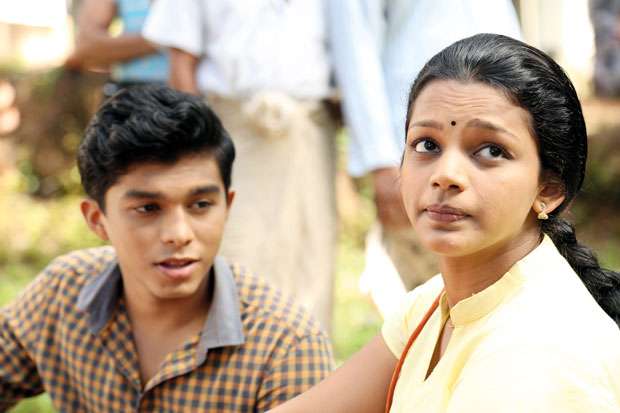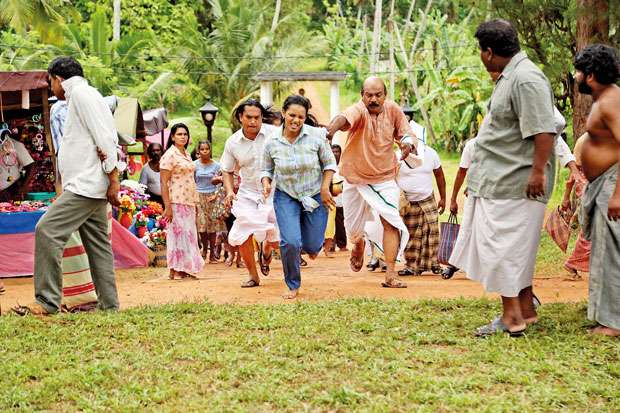Reply To:
Name - Reply Comment
Last Updated : 2024-04-16 15:40:00
 A lot in what we saw, and a lot in what we should have seen but did not. In that sense, Garasarapa left us groping for more
A lot in what we saw, and a lot in what we should have seen but did not. In that sense, Garasarapa left us groping for more
 Garasarapa, Jayantha Chandrasiri’s latest, was given a special screening at the Tharangani Hall at the National Film Corporation on Friday, the June 22.
Garasarapa, Jayantha Chandrasiri’s latest, was given a special screening at the Tharangani Hall at the National Film Corporation on Friday, the June 22.
Dewnaka Porage, in one sense the hero of Garasarapa, is the definitive younger face of Kamal Addaraarachchi, who plays his character as a psychology lecturer when he grows older.
Everything is there - the frown, the firm mouth, the aquiline eyes, even the stubborn resolve - and so when he woos a girl (played by the charming Kavindya Adikari), who happens to be swayed by morbid and supernatural forces, we only hope that when SHE grows older, she will be played by the actress who more than any other actress has been paired with Kamal in the movies.

But this excitement, this sense of nostalgia with respect to the film industry and its plethora of stars, is not at the heart of Jayantha Chandrasiri’s latest work, which meanders along, sometimes with purpose, sometimes without it, and ends up in a climax that is as anticlimactic as it’s going to get.
The payoff, so essential to Chandrasiri’s oeuvre, even in his television serials, is absent, and in a tragic way.
When Hail Caesar was released I contended that it was precisely what the Coen Brothers, with their descent into abstractions, intellectualisms, what-not, had us expect.
Roughly the same argument can now be made of Garasarapa. Perhaps that answers the question I posed at the end of my last piece on Jayantha.

Garasarapa is about memory, the discarding of memory, the keeping of promises, and the potency of love. It is about all these things, and it is about everything else too.
At its centre is an intriguing figure we see in only two or three scenes, rightly, someone who pops up from the deepest recesses of our collective consciousness and taunts our hero, the lecturer in psychology, for a wrong he committed decades ago.
As with Jayantha’s other works, Garasarapa hence interweaves two different eras: the present and 1980.
Significant, because the love story at the heart of the plot takes place against the backdrop of racial tensions and these years signify two eras with respect to the history of those tensions (Sinhala versus Tamil). In that sense, the film is probably Jayantha’s most culturally multifaceted yet because Sinhala and Tamil cohabit with Sinhala Buddhist and Catholic. What more can you say about a film which pits the famed Kalu kumaraya against a cane wielded by a well-meaning but strict padre?
The story’s simple enough. A boy, Sandaras Edirisinghe, and a girl, Vidya, fall in love (It’s love at first sight, of course) on their way to the church at Gadagama.

The girl, possessed by the Kalu kumaraya, can only be healed by the priest, played by Sriyantha Mendis, though the kumaraya finds his match in the boy, who owing to the potency of his love for her manages to dispel the villain, at least for the time being. (A few exorcisms later, all of which have the churchgoers dance in madness, overcome with the possession, the boy manages to get him out of her for good.)
The girl, however, has to leave for Canada owing to rising tensions between her family and elements sympathetic to the LTTE.
Decades later, having seemingly forgotten her and yet also having struck a deal with the kumaraya himself to find her, he marries a painter, Frankie, (Ameesha Kavindi), moves into a comfortable, upper middle class life, and finds his past catching up with him when she gets possessed by the serpentine prince.
The film has some of the fluidity and the crazy grandeur of Jayantha’s previous work, only this time he’s emboldened it all by resorting to some visual effects (Jayantha in the Divine: “Whether we like it or not, and whether we can or cannot, we have to try to join the rest of the world when making movies here”).

Two sequences stand out: The scenes of possession in the church when, while the Lord is being praised by the Padre, the churchgoers dance out with our two lovers as the only sane ones among the mob; and the sequence in which these two finally realise their affections for each other and they run out, the only animated people in a crowd that have clearly been made absolutely still by CGI.
It is Orpheus and Eurydice in Sri Lanka, a point was driven home by the unfolding of the plot later on, with Sandaras striking a deal with the prince, who promises her that if ever she returns to the country, she and he will find each other.
But while visually exciting, I felt there was something missing. It had to do with Jayantha’s theatricalism. He divorces speech from movement, words from the action, and thus isolates the two from each other to such an extent that even the song sequence in the film lacks the mobility it clearly needs. (We see the two lovers from two separate frames crooning at each other. The movement, the action, takes place elsewhere.)
Not that this issue stabs the eye; the sole redeeming point of the story is that it manages to transcend the hollowness of the theme of love.
And yet, hollow it is, not only because we have seen this kind of romance before (From Ali Mankada to Oba Nathuwa Oba Ekka), but also because the payoff we await is the payoff we get, particularly when the two do meet years later, and that in a contrived way.
Even the deal the boy strikes with the kumaraya, despite its Mephistophelian overtones, fails to deliver a bonus of any sort, because the catch to the deal is the catch we expected from the start: that he will meet her in circumstances which forbid them from seeing each other ever again.
The cast redeems the plot the best way they can and given that this was directed by Jayantha, to think that they could not redeem it is impossible. It’s the first time since Guerrilla Marketing, more than a decade ago, that Kamal Addaraarachchi, Sriyantha Mendis, and Jackson Anthony have been cast together, and while the three do not meet in the plot (Jackson, as I mentioned, is barely visible), their presence, together with that of Yashoda Wimaladharma (in a cameo) and Sangeetha Weeraratne (who is in a role we so eagerly expected her to be in the moment we saw her name in the credits), helped discernibly.
Jackson roars and winces, passionately in love with a woman he cannot have, while Sriyantha, world-weary as always, does what he can to “purge” her. When we see the two meet at a Church (of all places!) and when the hymns and sermons intersect with a manifestly “pagan myth”, we are astounded.
The performances help sustain our interest through this incongruous paradox (which is not a paradox once you think about how Catholicism in here has mingled with Buddhism, as with the poruwa), something I concede with respect to the new faces as well.
Given all this, what did Garasarapa entail or thematise?
I refuse to believe or concede ground to the power-of-love claptrap that so easily induces one to fall in love with any work of art from the beginning.
The theme, on the contrary, is to be found towards the end.
Sangeetha, a doctor, explains to the audience that while Western Science does not fit in easily with demonology, the two can and will cohabit, given the link between psychology and superstition.
This explanation, rudimentary at one level, is to me important because it reveals the Jayantha Chandrasiri who got swept away in the rest of the storyline thanks to that power-of-love rhetoric.
This is the Jayantha who believes in a link between the West and the East, superseding those dichotomies between magic and reality sustained by intellectuals and rationalists. (Demonic possession, to give just one example, is not the preserve of Sinhala or even Indian societies.)
That, and not the love triangle, is what came out at the end, though by the time it does come out, that triangle, and the overdrawn subplots around it which get nowhere (we see a friend of Kamal come and argue with him about finding the girl he loved; the conversation ends there itself, rather arbitrarily) ensure that such a theme gets washed away by the Butterfly Symphony-like idealism of the two lovers.
My friend Sahan, who sat next to me at the screening, comes from a generation that idolises Kamal, Sriyantha, and more than anyone else, Jackson, with the kind of devotion we exhibited when we were his age, and is more culturally sensitive and informed than the milieu I hail from. While enjoying the film (and predicting the “climax” and grinning at it as it unfolded), he seemed to feel that something wasn’t quite right.
“There’s a lot to extract from someone like Jackson, and a lot to extract from a plot like this” was his comment to me when we walked out. True.
There was a lot in what we saw, and a lot in what we should have seen but did not. In that sense, Garasarapa left us groping for more. But in the lot it contained, particularly with its performances, it is a return to form for Jayantha, one which may well strike a chord with both the young and the old. As it has pretty much all his previous work.
PS: Garasarapa is the second film by Jayantha after Samanala Sandhwaniya to not be scored by Premasiri Khemadasa. It is, as the opening titles make it clear, a tribute to the maestro, whom the young today are all the poorer for not hearing.
UDAKDEV1@GMAIL.COM

Add comment
Comments will be edited (grammar, spelling and slang) and authorized at the discretion of Daily Mirror online. The website also has the right not to publish selected comments.
Reply To:
Name - Reply Comment
On March 26, a couple arriving from Thailand was arrested with 88 live animal
According to villagers from Naula-Moragolla out of 105 families 80 can afford
Is the situation in Sri Lanka so grim that locals harbour hope that they coul
A recent post on social media revealed that three purple-faced langurs near t